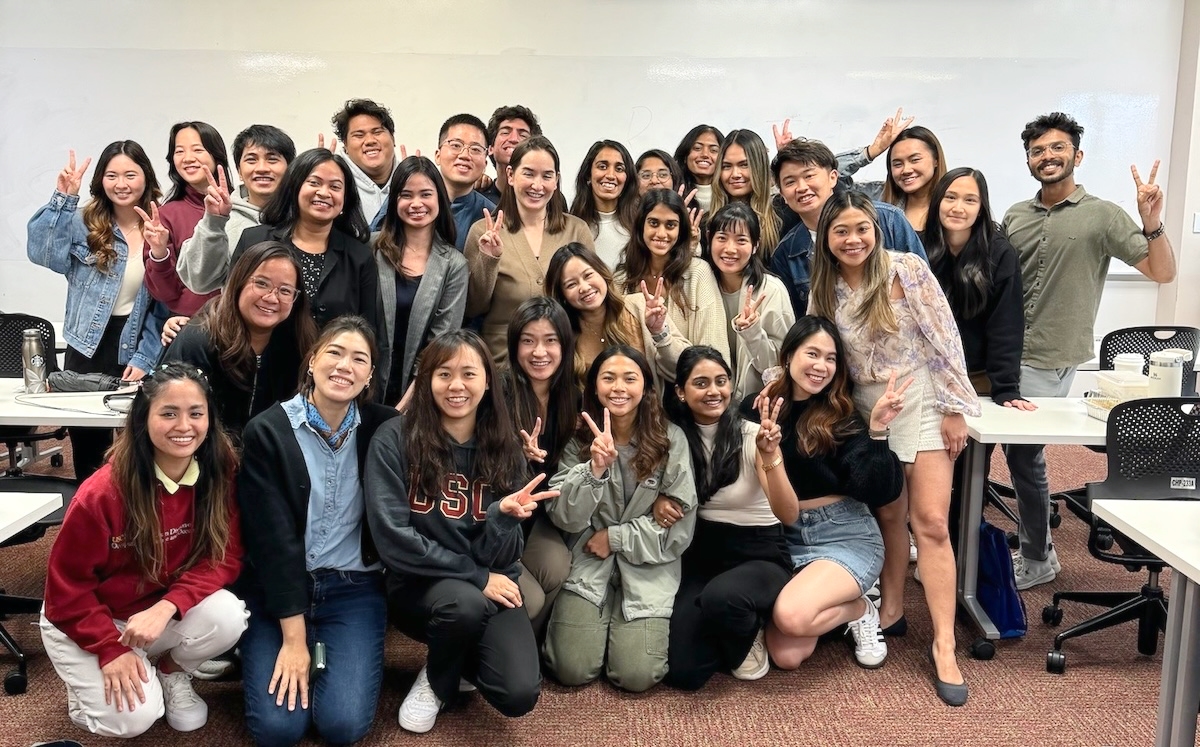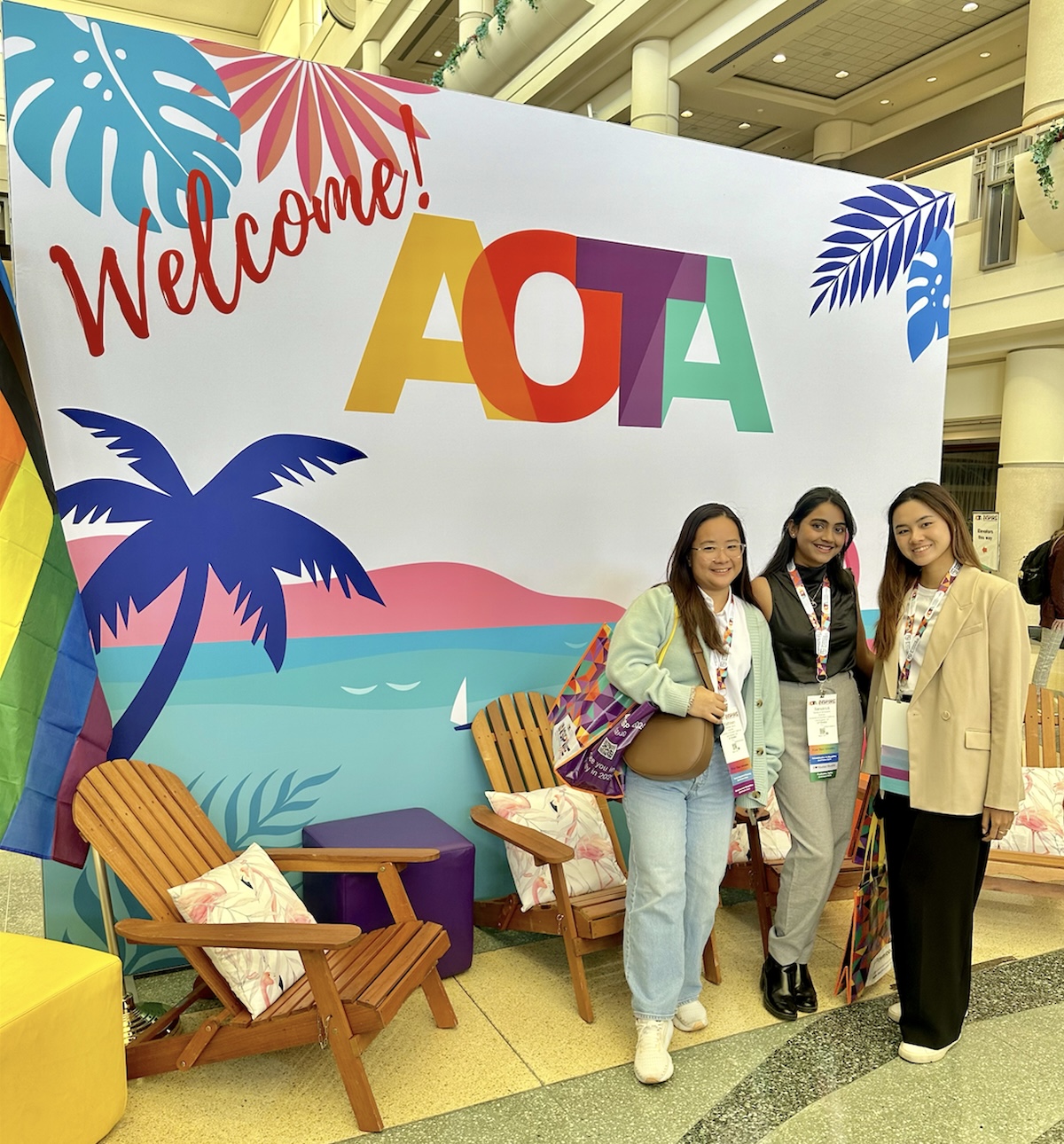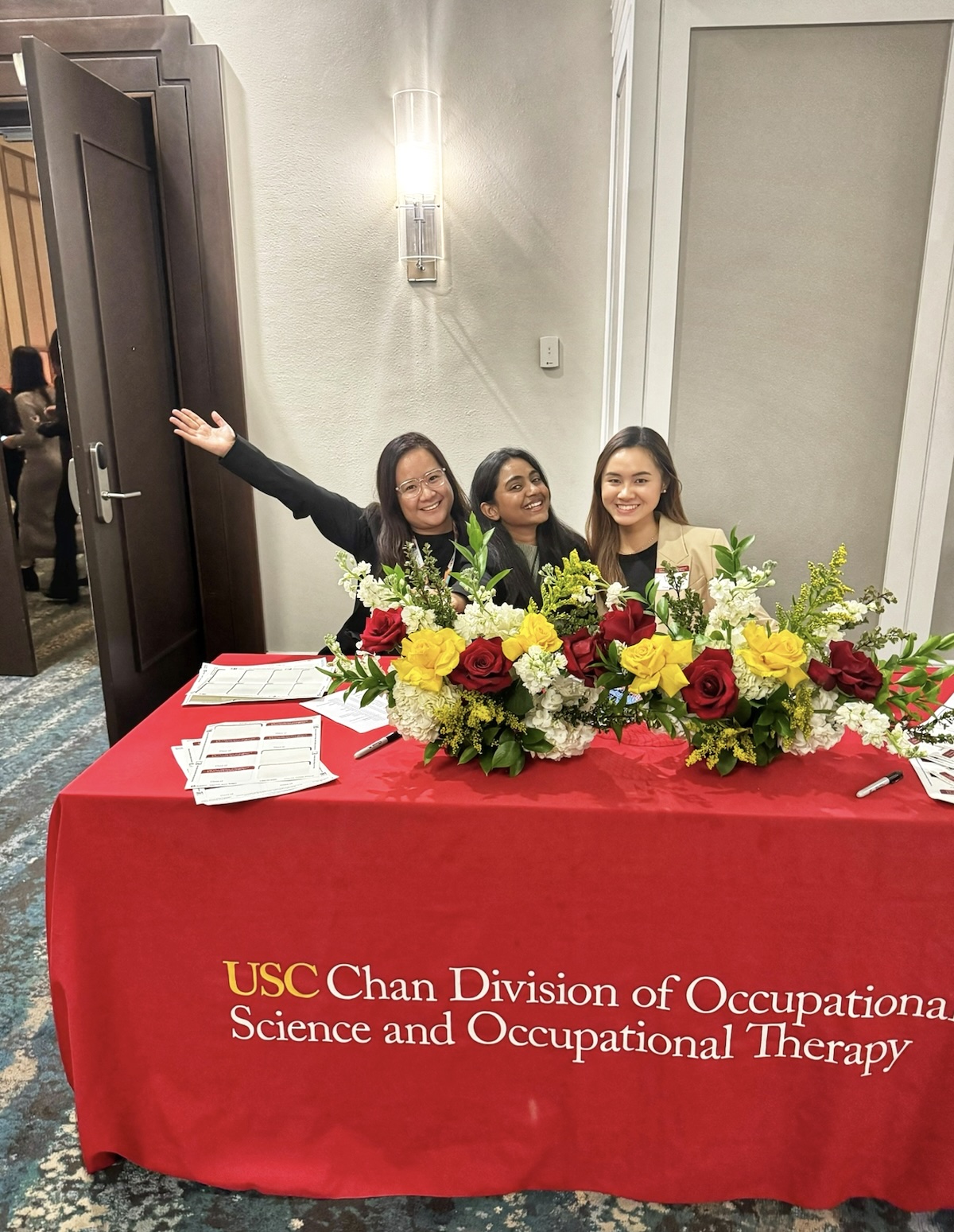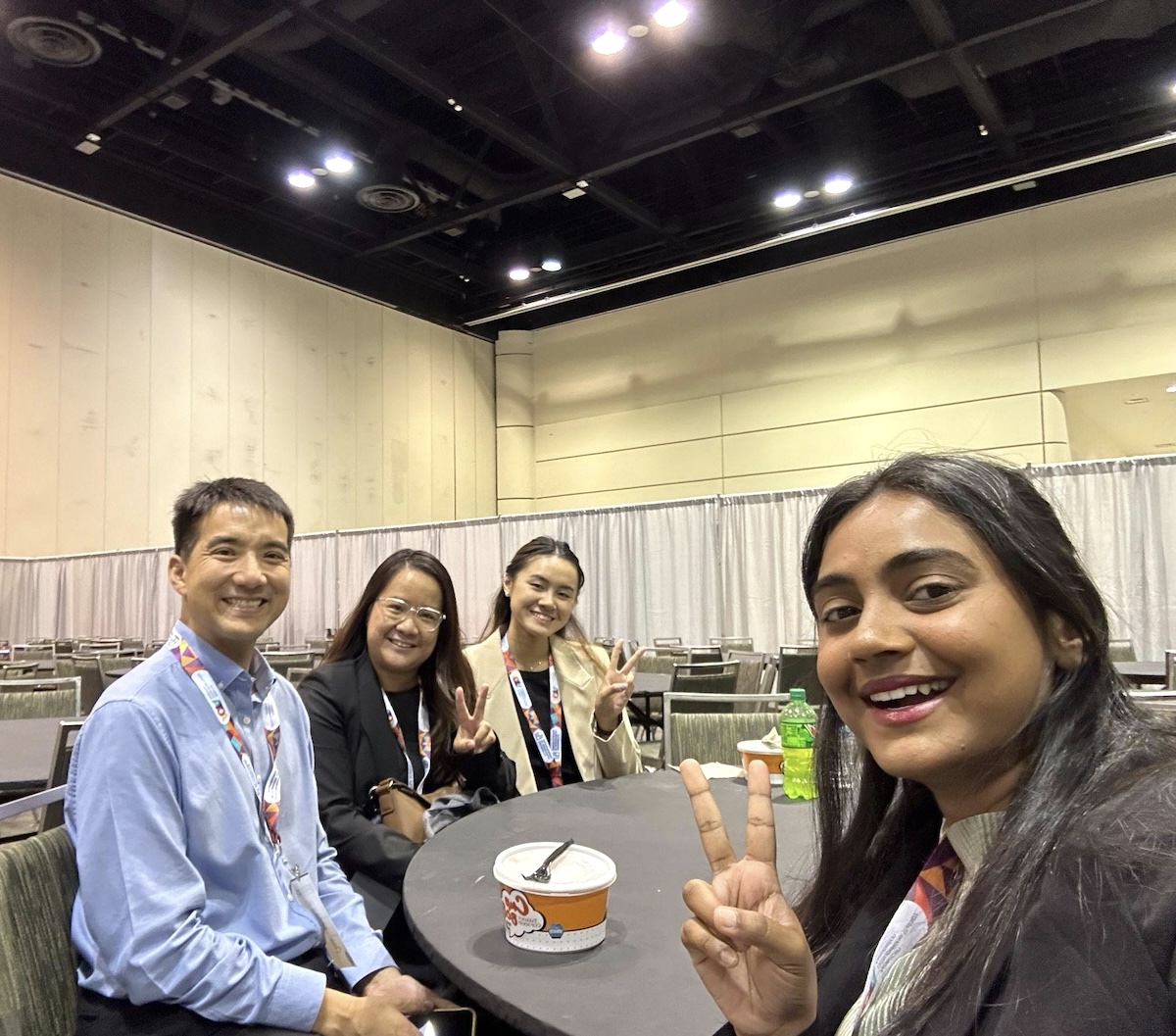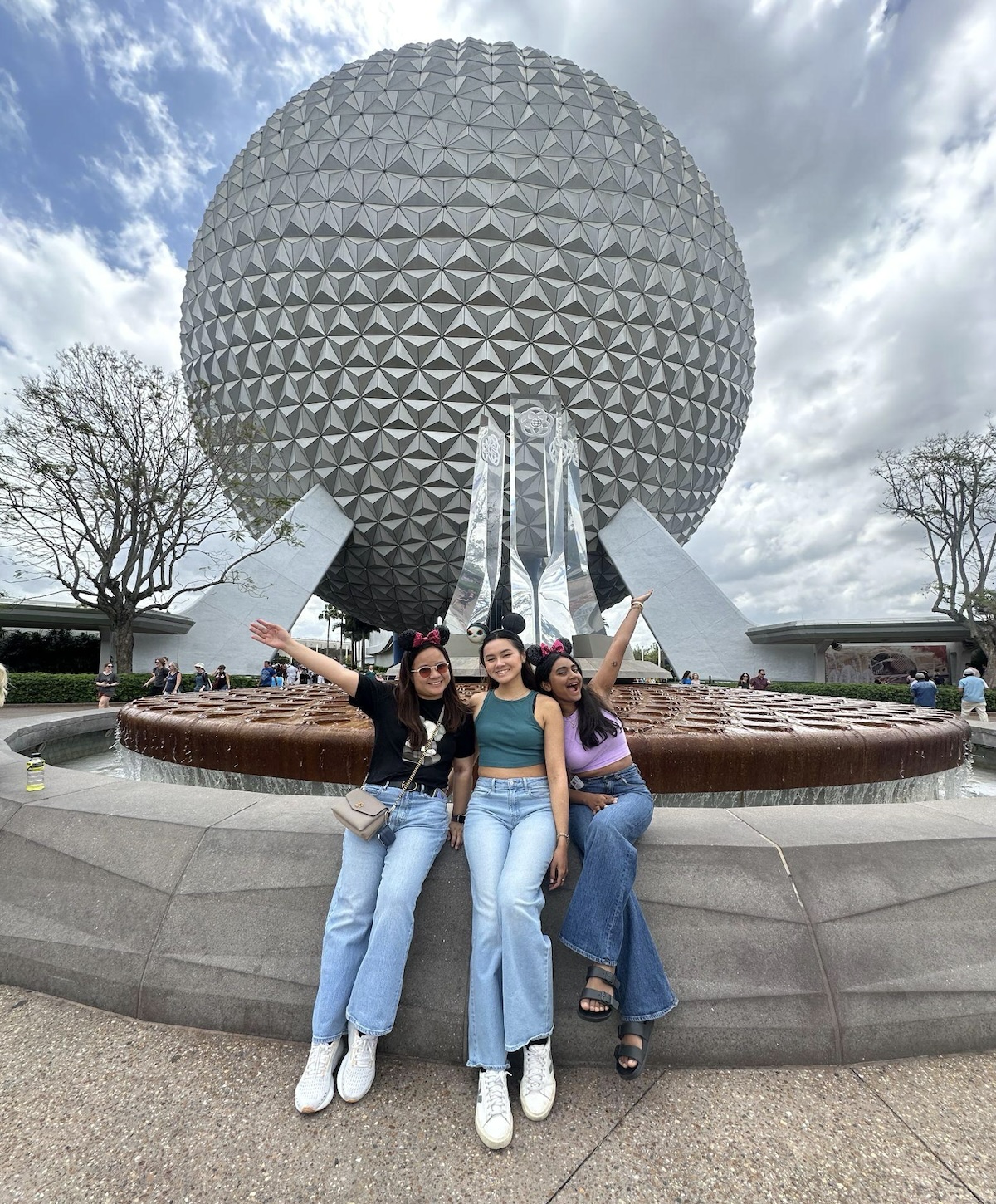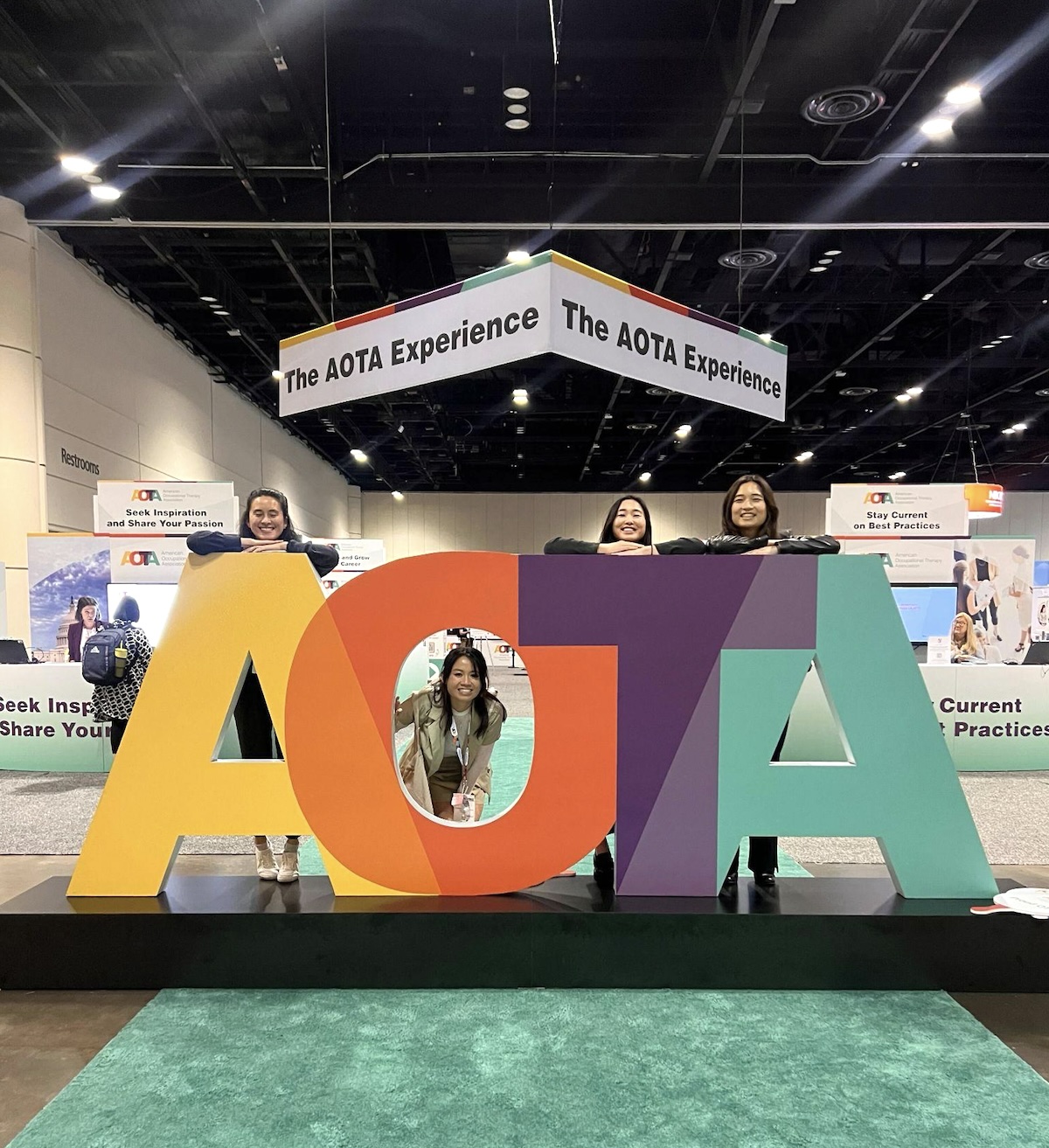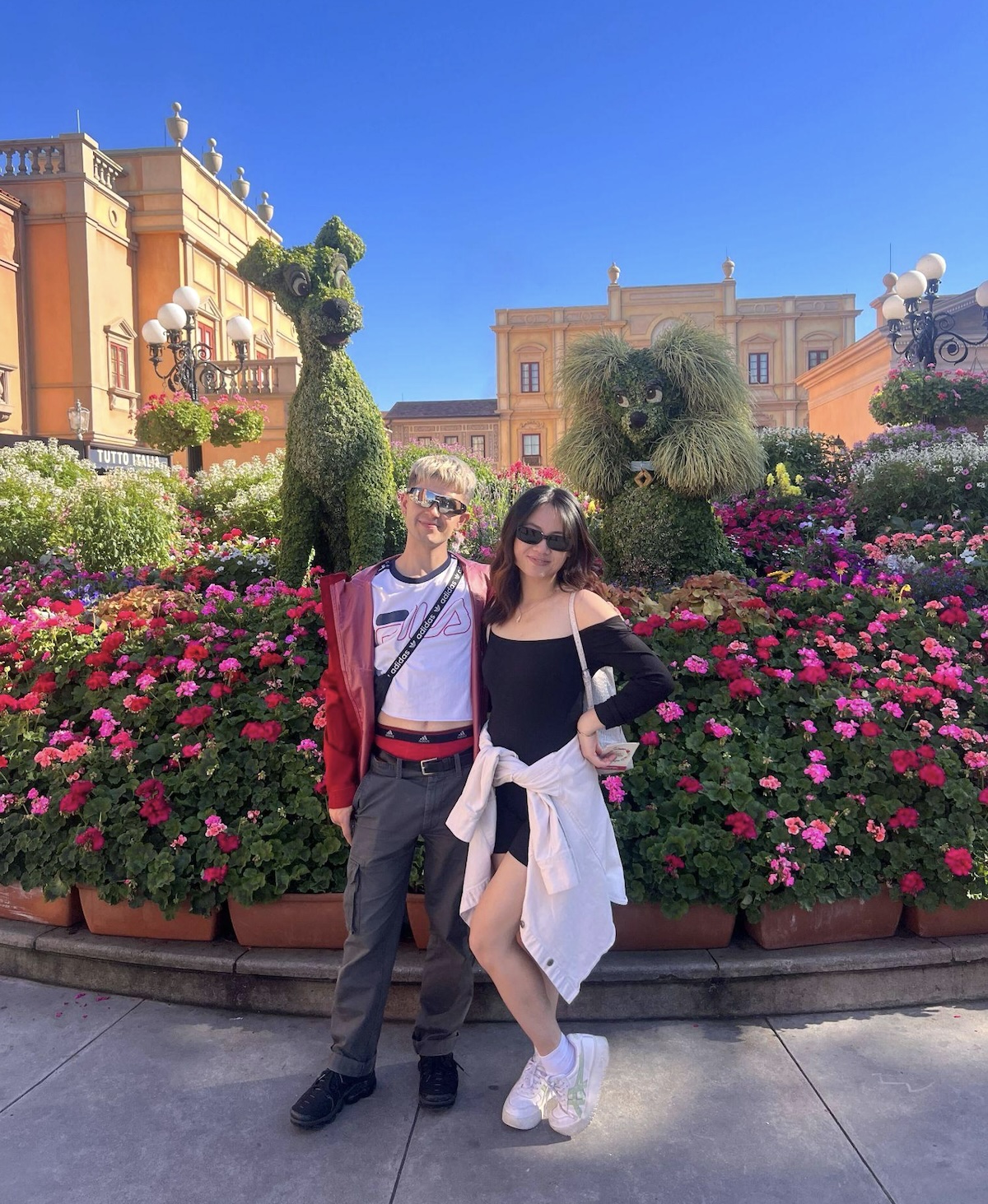Student Blog
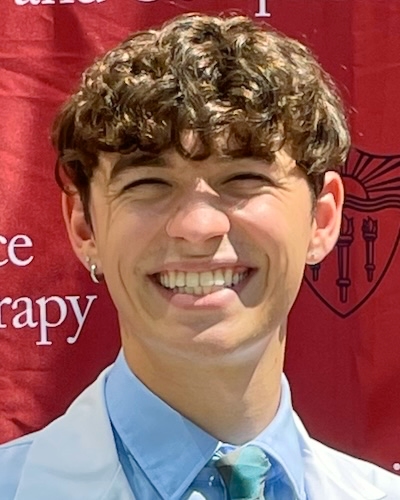
The Transcontinental Bachelor’s to Doctorate Student ⟩
May 24, 2024, by Mason
If you asked the average 17-year-old kid if they wanted to commit to a 6+ year program and move across the entire country they would probably look at you like you are crazy. This was the exact reaction I received when I told my peers, teachers, and even family members that I had decided to commit to USC Chan’s Accelerated Bachelor’s to Doctorate program as a senior in high school. Of the many concerns that people had around me, the biggest question people asked me was “Are you sure this is what you want to do with your life?” I remember that 17-year-old me would always get so bothered by this question, I couldn’t possibly understand why the people around me had so many concerns about me going into this program. Looking back on these memories almost 4 years later, as a more mature and grown person, I can say that I finally understand why people had these concerns. Choosing to go to college is one of the biggest decisions that people will make in their lives. It is an opportunity that will shape your career and your opportunities, and most importantly it will shape you into a hardworking adult capable of building a life for yourself. So, it’s understandable why those around me were hesitant that I made this decision so early on and so young. However, let me tell you a little bit more about the transcontinental Bachelor’s to Doctorate student and why after 4 years I am still just as passionate, driven, and heart set on becoming the best OT I can be.
I grew up in Sandy Hook, CT, a small east coast town that for most of my childhood life you would probably have never heard about. That is until December 14, 2012, when my town was victim to a historic school shooting that rocked the nation. Although the lived experience of this tragedy is not my story to tell, what I will share is the power and passion of the community I grew up in. I grew up in a town of resilience, made up of families, educators, and activists who set out to better the world around them. In the face of the greatest tragedy one could experience, I witnessed the greatest display of humanity and community that my town could offer. Even now, almost 3,000 miles away, I still remember these values of kindness and community and let them guide my actions.
My mother is an occupational therapist who works in the pediatric setting. Growing up and watching my mother practice taught me not only the importance and value of occupational therapy for children but also the understanding that every individual’s occupations have meaning. Whether it be a child playing with toys, an athlete competing in their sport, or me making my favorite latte in the morning, there is an inherent beauty in the meaning that comes from doing what we love. In the face of disability, illness, and life changes people lose that ability to do what they enjoy. My entire passion in life has always been to help those around me. So why at 17 did I choose that I wanted to be an occupational therapist? Because I know occupational therapy in its simplest form is helping people live their lives meaningfully. Because I know that as an occupational therapist, I can change the lives of my patients for the better.
Looking back, if I had the chance to talk to that 17-year-old high school student, contemplating moving thousands of miles from home to come study at USC, I wouldn’t change a thing. So to all those considering this program or any program for that matter, here is my biggest piece of advice. Find the passion that gives you meaning, and that is strong enough to drive you across the country to achieve your dreams. Although many will doubt you in life, let your passion drive you towards your goals and work hard to achieve them. Fight on!
⋯
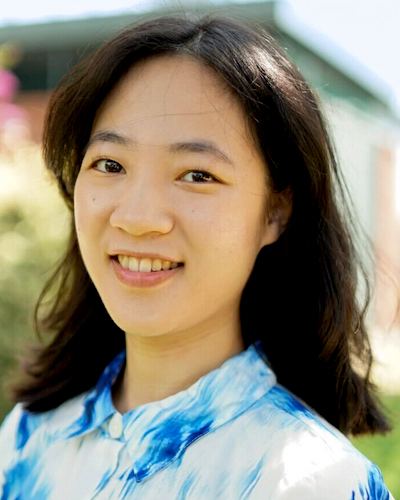
Some Things We Learned . . . ⟩
May 17, 2024, by Cindy
It is already May. I cannot believe I am graduating from the Post-Professional Master’s (PP-MA) program! I remember all my doubts about accepting the offer to the PP-MA program at USC Chan. I was unsure if leaving everything I was familiar with was the right choice. However, I wanted to pursue the OT profession and life further. I still remember the excitement and nervousness I felt on the orientation day. These two semesters were filled with participating in lectures, doing assignments, group discussions, and exploring life in a foreign country. With all the small steps we took, we have come so far. We know taking on this journey can seem intimidating. That’s why my classmates and I would like to share what we learned after nine months of navigating through grad school and life with you:
- “We are fortunate to have the chance to make positive changes in our lives or careers, so seize it with enthusiasm!” — Sherry Shang, Taiwan
- “Trust the process and enjoy it. It will all be worth it in the end.” — Briana Orteza (Philippines)
- “Stay curious and enjoy the journey ahead of you!” — Ann Chen, Taiwan
- “Make sure to build connections and enjoy every moment of the program because it’ll pass by QUICK. Also study haha and remember the purpose you’re here . . . ‘To make a change’.” — Pranav Bharat Dalvi, Mumbai, India
- “Find a great support system, and don’t forget to balance school and leisure 😊” — Sophia, Philippines
- “Being a foreigner in the US can be daunting and might cause some uneasiness to socialize. But you got this. Join organizations even if it means going to UPC. The friends I’ve made in the USC Dragonboat, SC Esports and Dungeons and Trojans are invaluable both emotionally and career wise, I feel I’ve setup several career paths by just making friends. Being a Trojan is part of your resume if you plan to stay.” — Topher Lumibao, Laguna, Philippines
- “Don’t be afraid to share your thoughts to the teachers and classmates! You will learn so much more!” — Roger Lo, Taiwan
- “Enjoy your time here! It’ll over before you know it 🙁” — Vera Kwok, Hong Kong
- “Even if it feels confusing at first, remember that the journey will be rewarding because OT didn’t just become your choice, OT chose you. ❤️” — Sanskruti P Sonawane, India
- “Stay Open to opportunities and view each experience, whether positive or negative, as a chance to learn. Embracing this perspective is key to personal growth, and remember to enjoy the process along the way!” — Beni, Phillippines
- “Don’t let anyone else define success for you.” — Vurshali, India
- “Remember, it’s not just reaching your destination that matters, but embracing the journey along the way. So, take a moment to savor life as you pursue your goals.” — Polyanna, Philippines
- “I’d like to say that please don’t be afraid to ask for help. You just need to voice your concern and help is there for you. Everyone is really supportive at Chan Division.” — Archie, Australia
- “You are here for a reason. Trust the process; it will all make sense one day.” — Nicole, Philippines
- “When things looks like they are falling apart, remember: looks can be deceiving! Do your best and don’t forget to have fun! You’ve got this!” — Ahmed Nader, Saudi Arabia
- “Enjoy diving into the limitless OT journey during your USC life! Fight On!” — Jasmine, Taiwan
- “Plan ahead and live in the moment. Search for opportunities and seize them.” — Yung-Hisn Chang, Taiwan
Whether you are thinking about taking on this journey, are preparing to start the journey, or in this journey, we hope that the things we learned can be an encouragement and reminder to you. Yes, you might find obstacles, challenges, and even tears along the way. However, you will gain new skills, knowledge, perspectives, friends, and growth you cannot find anywhere else. Doing all the tasks to go through the program has allowed us to become the professionals we have strived to be. After this year, I would like to tell the anxious me a year ago: “This will be more meaningful to your profession and life than you can imagine. You will not regret this!”
⋯
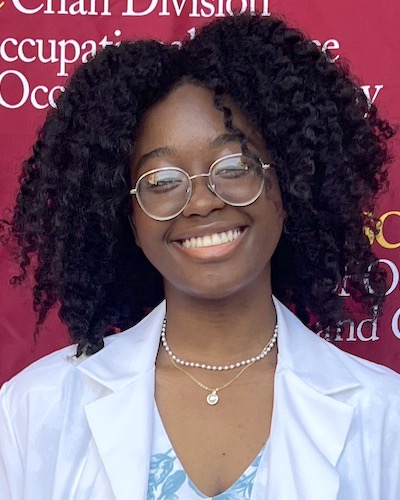
To Fieldwork, Thanks for Everything! ⟩
April 19, 2024, by Jaida
Fieldwork. It can be the best of times, it can be the worst of times. No two experiences are the same which can be both a blessing and a curse. A little bit before this time last year, I was starting off my first fieldwork experience at an inpatient acute hospital — talk about being nervous! The fact that any moves I made with the patient directly affected their wellbeing had me shaking in my boots! If I could go back in time, I would tell myself, “You’ve got this!”
Here’s what each of my fieldwork experiences has taught me and some takeaways that I hope can be helpful for you:
- Adult Rehab: Being in a fast paced environment can be nerve-wracking, so don’t forget to relax and enjoy the experience! Rely on your Fieldwork Educator to help build your clinical reasoning skills. They are a resource so use them! You’ll also have numerous resources from class and lab time, as well as your instructors, to help facilitate your success. While a level I fieldwork is more observation based, you are able to ask your educator questions to deepen your understanding about certain diagnoses. For example, if there’s a certain condition you learned in class that you’re wanting to know more about, your Fieldwork Educator can give you great insight as to how they have navigated it from their experiences.
- Mental Health: They just want to be treated like people, so don’t see them for what condition they have, but rather the potential of who they can become. Building rapport is key so if you’re a people person, this is your time to shine! Being in this setting can allow you to work on those interpersonal skills. Your classes at USC will teach you how to use your own therapeutic use of self, so feel free to ask your instructors how to help develop this skill more.
- Pediatrics: FUNctional treatments are key! This means that majority of the sessions will look like the therapist is playing with the child, when they are actually working on certain skills to work on developmental milestones. Even though they are a child, they also deserve some autonomy when it comes to figuring out what activities they want to do during their session. It’s not the end of the world if a child gets upset during sessions; if anything, this now gives you a sense of their likes/dislikes and how to problem-solve going forward.
- Geriatrics: Leave the ageism behind! Older adults can teach you so much about life. Don’t be afraid to ask questions about their lives; you never know what interesting things they’ll tell you. In doing so, you might also be able to provide insight on what activities the patients like to do. Continue to think outside the box and explore new avenues for engaging in treatment.
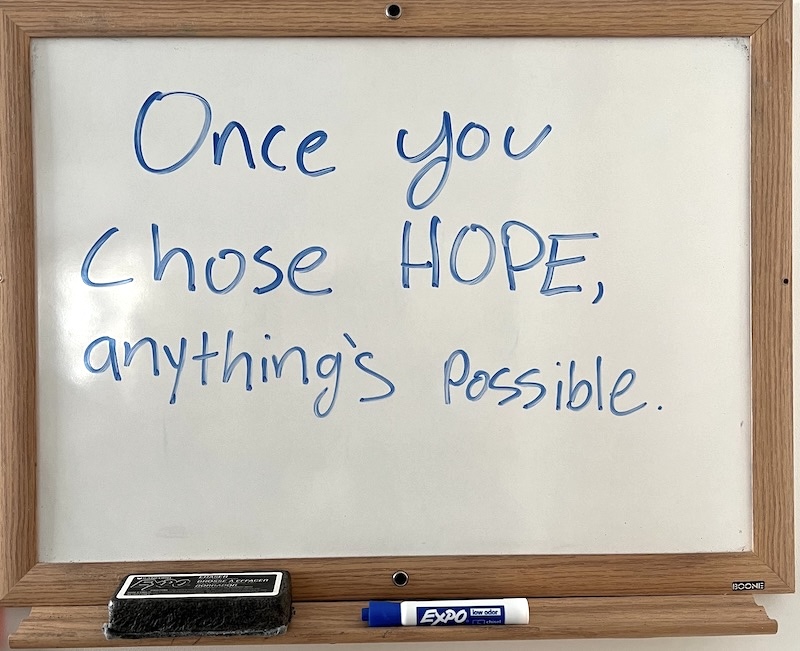
Loved reading the messages displayed on the whiteboard while at an inpatient acute setting; always brightened my day!
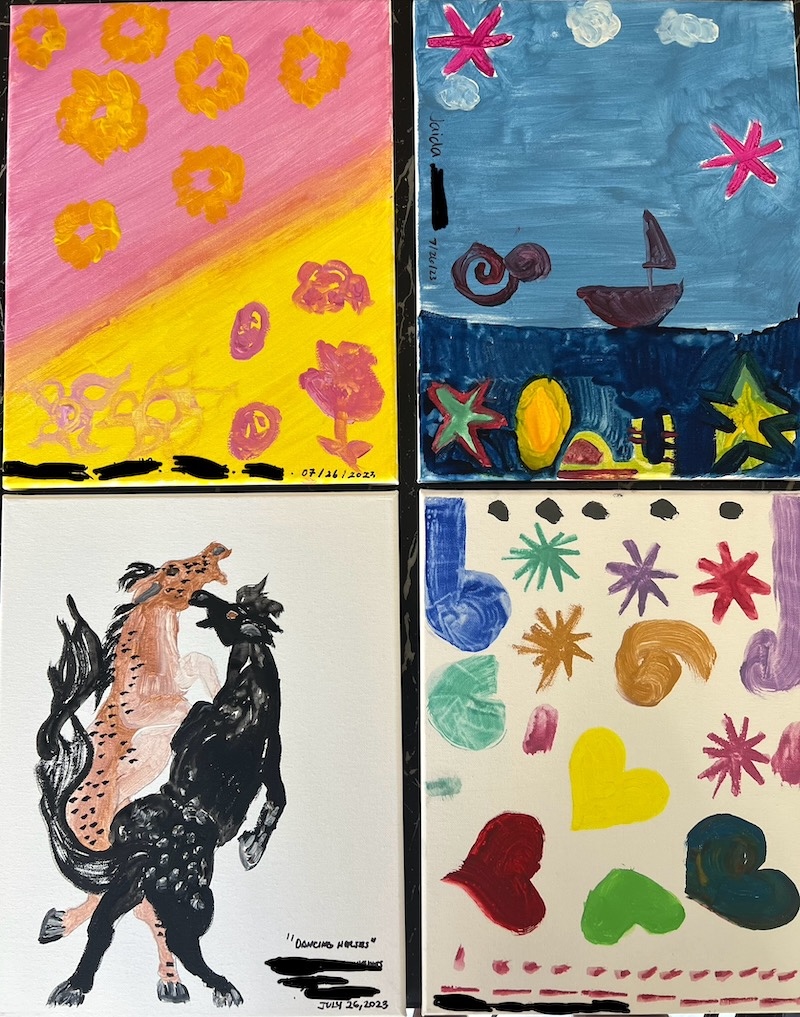
Had so much fun doing collaborative paintings with the residents on my last day at a board and care setting
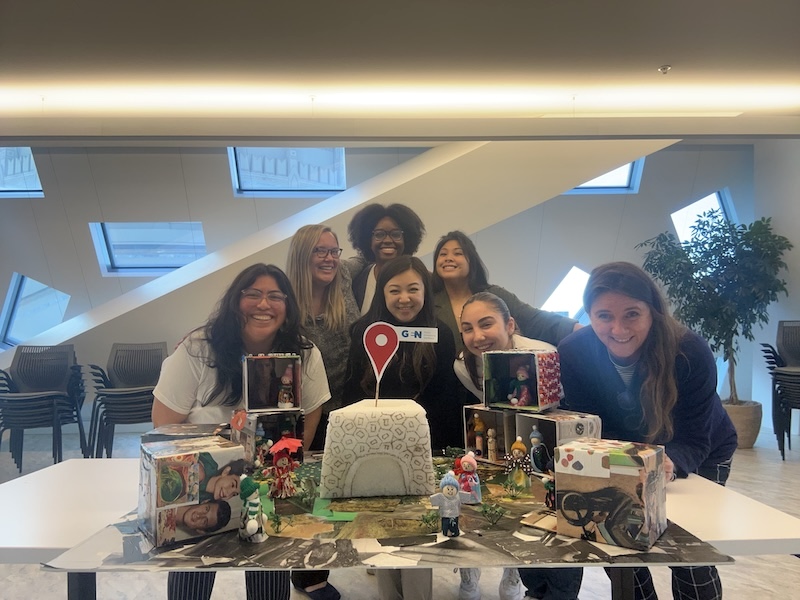
Working with these amazing people has allowed me to understand what true productive aging looks like with the members that come have fun here!
I am so grateful for all of the interactions I’ve had and lessons I’ve learned from each of my Level I fieldwork sites. Remember to engage in self-care as you go through your different immersions and give yourself some grace. Cheers to Level I and on to Level II!
⋯
Igniting Passion, Building Bridges: AOTA Orlando Chronicles! PP-MA & First-year E-OTD Perspectives ⟩
April 12, 2024, by Global Initiatives Team
By: Kathleen Jayne (PP-MA ’24), Wai Nga Vera Kwok (PP-MA ’24), Sanskruti Sonawane (PP-MA ’24), & Lydia Hong (E-OTD ’26)
Sanskruti: The AOTA conference was a dynamic hub of knowledge seekers, and I was thrilled to be there with my classmates Kath and Vera. We dove into sessions, starting with “Evidence-based strategies to assess and treat neuro-vision deficits in brain injury” by Dr. Sanchala Sen. This session broadened my understanding of the various other fields in OT. Post-session, I had a very insightful and wholesome conversation with Dr. Sen; it instilled in me a sense of pride and motivation after attending a wonderful lecture of a fellow Indian who has made a noteworthy contribution to the field of OT. Another highlight was the session on “Lymphedema and chronic edema in an inpatient acute care program” by Sarah Colwell and Amy Sommerville. Their engaging presentation sparked my interest in working with the lymphedema population. The expo hall was a bustling space where we explored different stalls and had a refreshing lunch. Later, I attended “Learning to administer the FUEL (Functional Upper Extremity Levels)” by Dr. Daniel Geller, an assistant professor at Columbia University. While this lecture explained the scale of FUEL, it also gave me a sense of understanding of what we do and why we do it.
Day two brought more enriching sessions, including “OT Intervention for Bladder and Bowel Dysfunction” and a fascinating lecture on blending technology and music for students with special needs, presented by Mary Hager. As someone involved in the Lifestyle Redesign Graduate Certificate program, “Promoting Sleep and Rest to Improve Outcomes & Quality of Life for Older Adults in Long Term Care” provided valuable insights and techniques for my practice. Learning about sleep pattern changes, conducting various sleep screens and assessments, and discovering new techniques for promoting sleep and rest will greatly enhance my ability to improve outcomes and quality of life for older adults.
Kath: AOTA Inspire offered a range of topics, but as I envision myself working in pediatric care, I focused on sessions related to this setting. It was tough deciding which ones to attend because they all seemed valuable. Two sessions stood out for me: Designing sensory-informed trauma responsive interventions in pediatric settings and Combining SI with other approaches like Executive Function, NDT and behavioral approach. Having previously worked in a US schools setting, I gained insights into group homes and foster care, which are not common in the Philippines, my home country. These sessions provided me with a deeper understanding of how to support my future clients effectively. The SI session was particularly engaging as well as it explored combining sensory integration with different therapeutic approaches. Overall, the conference was a fantastic learning experience, and I can’t wait to apply these insights in my practice.
Vera: Scrolling through the list of sessions during the AOTA conference, I had a hard time deciding which ones to attend as so many of them are useful and interesting. I ended up choosing topics that are more related to my current clinical placement at an outpatient pediatric clinic where I see children with sensory processing issues and traumatic past experiences. I attended some courses related to pediatric mental health and trauma-informed care. One of them was a course on sensory-informed, trauma-responsive tiered support. The speaker adopted the tiered approach and introduced interventions for children who experienced childhood trauma. It was eye-opening as it really looked into the child’s needs from a whole-person perspective. They suggested that OTs should advocate for our clients in the school system, but not only provide individual treatments. The environment that we create for the children should be inclusive so that every child should feel safe, and the children with special needs should be given opportunities to adapt according to their own needs. It provided me with a new perspective when looking at an inclusive environment for children with special needs. After attending the sessions of day 2, we went to the COTAD Happy Hour, where we met Dr. Janis Yue. We had an inspiring and fruitful discussion with her, especially about the topic of trauma-informed care, which is her specialty. As a student, seeing a young, outstanding scholar sharing her passion and specialty is so empowering. I am looking forward to connecting with her and learning more about her expertise! During the poster sessions, I enjoyed a presentation by Ying-Chia Kao, from Kaohsiung Medical University, on the topic of changes in sensory processing ability in adults post-COVID. It is interesting seeing international perspectives in the conference, as it encourages international collaboration in our profession!
We also volunteered with check-in during the Trojan Family Reception. This event provided us with the opportunity to connect and network not only with esteemed USC alumni who are experts in their field and fellow students from other cohorts but also with potential future employers post-graduation. It was fantastic witnessing everyone enjoying themselves that evening with an abundance of food, drinks, and dancing!
Lunch with Dr. Danny Park!
Wrapping up the conference, we added a touch of magic with a visit to Disney World’s Epcot, enjoying its culinary delights, thrilling rides, cultural themes, and breathtaking fireworks. The AOTA conference was not just a professional journey but a personal one filled with learning, connections, and unforgettable experiences. And the best thing is that we get to experience attending the conference for the first time with friends! While this was our first time attending the AOTA conference, it certainly won’t be our last. We’re excited for the next conference and we’re hoping that more of our friends will be able to attend.
Lydia: As a first-year student, I was a bit nervous about attending my first conference, but excitement quickly replaced my nerves. Our faculty and peers truly made my experience by inviting me to Epcot and showing me the conference ropes. Even in Florida, the Trojan family was everywhere, from running sessions, presenting posters, and breaking it down on the reception dance floor. My favorite sessions were Tech Lab 201: Use of Virtual Reality as a Clinical Tool for Anxiety in Students and Workshop 306: Mental Health Promotion in the School Setting: OT’s Distinct Value. I feel so lucky to enter the OT landscape as it evolves to enrich the discussion and research of mental health. My biggest takeaway was that the OT world is vast, and every practitioner’s unique interests drive our field. My heaviest takeaway was my check-on luggage full of goodies from the expo halls. As I left Orlando, I felt thrilled by the endless opportunities in our field. I can’t wait to apply the knowledge and skills I gained from AOTA to my classes and future practice. Fight on!
⋯
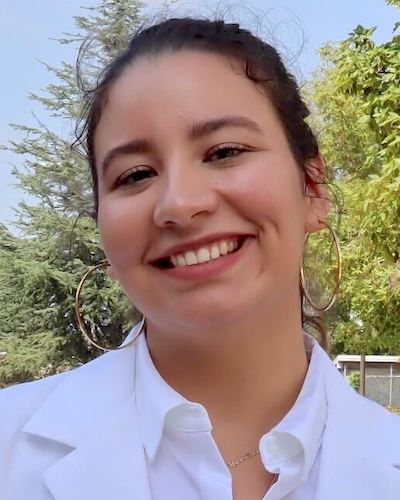
Lessons I Did NOT Expect OT School to Teach Me ⟩
April 2, 2024, by Natalie
Classes Life Hacks School/Life Balance
Hey everyone! I am back with a new list that I hope you will relate to, save, and refer back to when needed. Looking back at my last two years, these lessons I have learned have helped me grow as a person, as a professional, and as a future clinician. These lessons are not listed in our “Program Outcomes” or “Learning Objectives”. They are lessons I think everyone eventually learns, but that I learned when I felt challenged and pushed past my comfort zone.
Grades do not matter as much as you think. The Division has strict rules about the grade students are required to earn in any course in order to have those course credits apply towards earning the degree. According to the USC Chan Division of Occupational Science and Occupational Therapy (2023) student handbook:
The minimum passing grade in all OT required courses is C or above . . . To be eligible for graduation, a graduate OT student must achieve a final overall cumulative GPA of 3.0 or above AND a GPA of 3.0 or above on all courses applied to the entry-OTD degree (p. 15).
As long as you reach that required grade point average, there is no need to stress about every grade point percentage. No future client will ever ask you what grade you got on your adult rehab midterms; they will just be happy that you know what you need to know in order to help them. That being said . . .
You know so much more than you think. There have been too many times when I stress over an upcoming exam or feel a little reluctant to raise my hand in class because I feel unsure about my response, and more often than not, I come out doing pretty well! I do study and prepare for those exams and practicums though, I just usually feel I need a few more days to review. Personally, I have noticed that as long as I complete my readings and assignments and pay attention in class, my brain retains so much more than I realize.
Do not let your imposter syndrome get the best of you. You are capable, smart, and will be an amazing OT one day. You belong here at the top OT program in the nation, and you have the necessary tools and skills to earn your degree. When the imposter syndrome does hit, because it always does at some point, remember why you chose to pursue OT and what motivates you the most to always show up. Turn on music that helps you feel confident and powerful and push past the feelings of not being capable.
Remember that you are your harshest critic. It is important to keep in mind that you are likely the only person who expects you to do amazing in every single aspect of your life all the time. Obviously, give your best in everything that you do but recognize that your best may fluctuate depending on how many things you have going on at any given time. I read something once that said, “If one day, all you can give is 40% and you give that, you gave your 100% that day.” Being able to prioritize tasks and dividing your energy and focus in order for you to complete everything you have to get done is a really difficult but crucial skill that grad school will teach you if you have not learned it already.
Do NOT compare yourself to others. Everyone will tell you this tip from the start and it is easier said than done to learn, but the sooner you stop comparing yourself to others, the better. Save your energy and mental health and just do you.
Know yourself well. Know your strengths, your limitations, what strategies work for you, what type of help you need and when you need that help in order to keep yourself afloat. Also keep in mind that the strategies that work for you may change based on the situations or assignments you have going on. Adapt as needed and trust your gut.
Put your oxygen mask on first. With how busy grad school can get, it is so imperative that you take care of yourself first before anything else. You need to ensure you do what is needed for yourself in order to put your best effort forward in the work, activities, events, organizations, and relationships you are a part of. Taking care of yourself helps you avoid burnout and trust me, it is such a better option than trying to overcome the burnout.
Mistakes happen and are not the end of the world. In fact, mistakes help you learn! I have learned the most when I make mistakes because as human beings, we don’t like being wrong. It is better to make mistakes in class or during OT school than it is when you are out in the field later on (. . . and even then, those mistakes are okay too! Acknowledge the error, do your best to fix it, and move on!)
Trust the process. A lot of different things in OT will stress you out and may feel out of your control. Sometimes the material in a course is not coming together the way you thought it would. The course material will come together eventually (again, this varies per person: ask for help as you feel you need). The fieldwork process may be particularly stressful if you want any one specific site or practice area. You will get the experience required in order to earn your degree and sit for the NBCOT, even if it is not exactly what you want. In my mental health immersion I wanted to be placed in an inpatient psychiatric hospital and was placed in a Transitional Supported Housing Program. Looking back, I would not trade that experience for anything in the world. Every single alumni member I have spoken to, whether they are on the faculty or not, have told me to trust the process, after assuring me that they too felt similarly when they were a student.
Generalist versus Specialist. This one probably feels out of place and is very OT school specific compared to the rest of these lessons — I know what these words mean, but in terms of being in OT school, I had to learn what that meant for what I was learning in class. There are so many different specialties that OTs can gain knowledge in and it is hard to remember that as an OT student I need to focus on learning enough about everything in order to pass the certification exam as well as be able to practice in almost any setting that I choose. My time for specializing in specific topics will come, as will yours.
There you have it! I hope this newfound knowledge inspires you and helps you feel prepared for when these lessons inevitably sneak up on you. If you have any questions or would like to chat, feel free to reach out to .(JavaScript must be enabled to view this email address) and I will get back to you as soon as I can! Fight on!!
⋯






